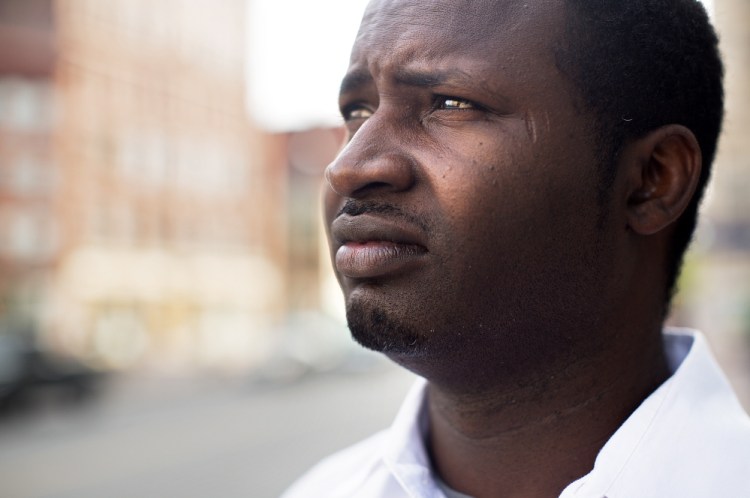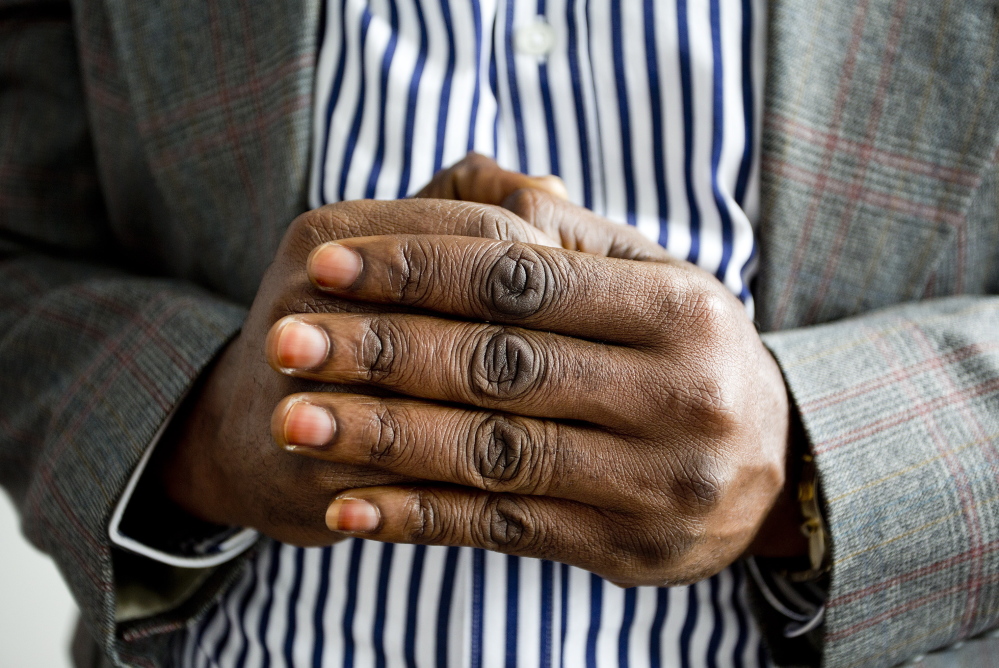At the beginning, Hamet Ly thought it was a joke. But for months, the death threats kept coming.
Then, one night in 2014 in the Mauritanian capital of Nouakchott, where Ly had spent more than four years working at the U.S. Embassy, someone chased him through the streets.
“I was always seen as a traitor,” Ly said in near-perfect English, one of the five languages he speaks. “People wanted to kill me, and that’s why I wanted to get out.”
So Ly gathered his family, boarded a plane and joined the roughly 1,000 legal immigrants in Portland who are seeking asylum in the United States but are unable to work for at least six months while their applications are processed. After spending nearly two months in a family crisis shelter, Ly applied for the meager but life-sustaining benefits known as General Assistance – help that could be eliminated by the city of Portland in the fiscal year that starts July 1.
“I’ve never been unemployed in my life,” said Ly, who holds a master’s degree in management from a French university. “But this was the only choice I had. I had to take it.”
If lawmakers in Augusta and city officials in Portland choose not to fund the $3 million annual cost of the benefits, Ly and others like him could be forced onto the streets, or back into the city’s already overcrowded homeless shelters.
“It will be a disaster,” Ly said.
Because of federal immigration rules, asylum seekers are not allowed to work for at least six months after their application is submitted, putting them in a state of legal limbo. They are considered lawfully present in the U.S. but are unable to earn a living here without risking being sent back to a hostile homeland.
The rule is not always hard and fast, and complications in the legal process can “stop the clock” on the six-month waiting period, stretching out the immigration doughnut hole beyond half a year.
One immigrant named Clovis – who asked that only his first name be used because he fears that speaking out would endanger his family, who remain in the Democratic Republic of Congo – said he does not know how long he could be waiting for a work permit.
Clovis was targeted by members of a military division known for harassing and assaulting citizens. He fled the country after a confrontation in which he was bayoneted and beaten by a group of soldiers, eventually coming to the U.S. in 2013.
Once he arrived in Portland, Clovis began receiving General Assistance, and was taken in by other Congolese in Portland who helped him find food, housing and other resources.
“General Assistance was very kind with me,” Clovis said. “They gave me basic support, gave me food” and helped him integrate into the community, he said.
Last year, however, as he walked with a friend through Kennedy Park in Portland, he was attacked by a group of men and severely beaten.
Because he is helping the Portland police prosecute his assailants, Clovis is eligible for a U Visa, for people who help law enforcement solve a crime.
While his visa application is being processed, his separate asylum case has been paused, placing him in an even longer period of administrative limbo.
“The asylum clock is complicated,” said Phil Mantis, an immigration attorney representing Clovis. Mantis leads the asylum program for the Immigrant Legal Advocacy Program in Portland.
How long it will take to complete the visa case is unknowable, Mantis said.
“The immigration system can work very slowly, for good or for bad,” he said.
For years, the state’s General Assistance program has filled the gap between the time when people apply for asylum and when their case is decided, dispensing vouchers for rent, food and basic necessities, but little else.
The arrangement stood until last summer, when Gov. Paul LePage announced that Maine would comply with a federal welfare reform law passed in 1996 that bars certain categories of immigrants, including asylum seekers, from receiving government benefits.
The governor, in the midst of a re-election campaign, promised to reform the state’s welfare programs. LePage has argued that the state must reorder its priorities when it comes to spending the precious few dollars it has for the needy, advocating for greater attention to elderly Mainers in nursing homes and to people on waiting lists to receive state-funded medical care.
But Portland and the city of Westbrook contested the change, arguing in a lawsuit against the Maine Department of Health and Human Services that the policy was executed illegally, without going through a mandated rule-making process in which the public, the state attorney general and legislators can have their say.
In a ruling handed down last Tuesday, just weeks before legislators and city officials must pass their budgets, a Superior Court judge handed a victory to the LePage administration, saying it could continue to withhold the reimbursements. But the judge also chastised the government for overtly skirting the legally required process.
That means Portland faces a possible multimillion-dollar hole in its upcoming budget, which the City Council is set to vote on June 24.
“Whatever Portland does is contingent on what the state decides to do,” said Robyn Merrill, executive director of Maine Equal Justice Partners, a group that assists low-income and vulnerable people with legal matters. “The politics are frustrating when so much is at stake and people’s lives are affected.”
Before he was threatened directly with death, Ly said he had always felt an uneasy relationship with his home country in northwest Africa.
Ly said that for as long as he can remember, black Mauritanians have been oppressed by the Arab Berber population, who at times in the country’s past waged social and military campaigns to remove black citizens from power, force them from their land or expel them from the country.
“I always felt like a stranger in my own country,” he said.
Pervasive poverty, high unemployment, an undeveloped economy and a lack of basic infrastructure served as a backdrop in Mauritania.
Growing up in the atmosphere of unrest, Ly said he could not remember a time when he was happy or his community was at peace.
Ultimately, it was education that provided him a way out of poverty.
After studying in Niort, France, Ly earned a master’s degree in management before returning home to Mauritania, where he was hired by the U.S. Embassy.
In 2010, Ly was issued a five-year visa that allowed him to travel to and from the U.S. on business, connecting American companies with Mauritanian customers.
He traveled to Las Vegas, Chicago and Washington, D.C., escorting delegates from Mauritania and attending trade shows and professional development sessions.
But his position as an employee of the U.S. government earned him enemies.
“I was always seen as a traitor,” Ly said. “That was the struggle.”
When his troubles escalated – he declined to be specific, other than to say he encountered a sensitive situation – and local criminals sought to kill him, he fled the country.
After a short stint in Buffalo, New York, Ly said he heard that Portland was a peaceful place with an existing community of immigrants like himself.
Since he arrived here and was granted General Assistance last year, Ly, his wife and two sons have lived on about $1,600 a month.
More than half of it, $1,025, goes toward rent, leaving less than $600 to feed a family of four.
“It is very hard to not work,” said Ly, who is expecting to be cleared to work by August. “It’s misusing my ability, my skills, letting (them) die. Not working means not having control over your life.”
When his sons, ages 4 and 2, ask Ly to buy them things, he has to explain that they cannot afford it. Shopping at the grocery store is an anxiety-producing event.
“You feel stressed, always,” he said. “What to take, what to put in your basket.”
Ly said he does not understand the explanation that elderly or sick Mainers need the assistance more than he does.
“Vulnerability is vulnerability, no matter the color of your skin or your disability,” he said.
Immigrants, with their willingness to do jobs that Mainers don’t want to do, become taxpayers and contributing members of society, he said.
“I want to make people understand who we are and what we can do for this country, not what we’re looking to get from this country,” Ly said.
Send questions/comments to the editors.





Success. Please wait for the page to reload. If the page does not reload within 5 seconds, please refresh the page.
Enter your email and password to access comments.
Hi, to comment on stories you must . This profile is in addition to your subscription and website login.
Already have a commenting profile? .
Invalid username/password.
Please check your email to confirm and complete your registration.
Only subscribers are eligible to post comments. Please subscribe or login first for digital access. Here’s why.
Use the form below to reset your password. When you've submitted your account email, we will send an email with a reset code.